Over the last two weeks, protests organized around #EndSARS—the mass action calling for a complete ban of the Special Anti-Robbery Squad (SARS) of the Nigerian police force—has rocked cities across Nigeria. Set up in the mid-1990s to combat incidences of armed robbery, SARS has over the years metamorphosed into a force associated with harassment of innocent citizens, extortion at gunpoint, and extrajudicial killings of suspects.
Drivers and demands of #EndSARS
An overwhelming majority of those participating in the protest are young Nigerians. Notably, Nigeria has a rich history of youth protests: Nigeria’s independence movement even started as a youth protest. The bottled anger of many of the country’s youth over unfair profiling and harassment by SARS in particular has found an outlet in this protest, which started with no defined or any central leadership. The protesters’ demands at the beginning were straightforward: The federal government should abolish SARS, provide justice to victims of police brutality, and reform the police. Now, the demands have widened, premised on the pervasive failure of the government to deliver equitable economic prosperity for its citizens and these enraged youths in particular. In addition to calling for law enforcement agencies to respect the rule of law, youth are demanding more respect for human rights and a deepening of democracy. The protesters are also demanding a revival of the educational and health systems and stronger efforts toward job creation. In short, the message of the #EndSARS protest is that young Nigerians want to take back their country from the entrenched political order that they believe has not served their interests. Indeed, earlier this month, the governor of Lagos State submitted their 7-point agenda to President Buhari on behalf of the protesters.
The discontent among youth was already simmering given the economic crisis sparked by the fall in global oil demand (and compounded by the outbreak of the COVID-19 pandemic), institutionalized corruption, and state profligacy that have drawn more Nigerians into poverty. The foregoing coincided with eight months of closure of educational institutions due to strikes held by university lecturers, leaving many young people alienated and angry. According to the National Bureau of Statistics, as of the second quarter of 2020, the unemployment rate in Nigeria stood at a staggering 27.1 percent and the underemployment rate at 28.6 percent. Of the 21.7 million unemployed, young people (aged 15 to 34) account for a whopping 34.9 percent. They also account for 28.2 percent of the 22.9 million underemployed Nigerians.
Worsening economic conditions and bleak projections for the future have only fanned the flames. The country has barely recovered from the economic recession that started in 2016, and President Buhari has now called on Nigerians to brace for another recession. Youth were already incensed by reports of high-level elites’ corruption, galloping inflation, and unprecedented levels of unemployment, and now the government has announced increases in the price of fuel and an electricity tariff.
Against this background, the #EndSARS protests have become a symbol for broader resentment and opened the path for marginalized Nigerian youths to vent bottled-up grievances against the government, starting with the excesses of SARS, which the government has failed to address after several promises of reform. Problems with SARS are not new, in fact: Protests against its brutality date back to 2010, and announcements on disbanding it were first made in 2014, then again in 2015, 2016, and 2019. The nonpartisan nature of the #EndSARS protest explains the wider support it enjoyed from the general public, and the successes it recorded.
What comes next for the #EndSARS protests?
Now that the wave of street protests has subsided due to military clampdown on the protesters, how #EndSARS unfolds—both intentionally and unintentionally—depends on its organization and the state’s response. The role of social media in driving the #EndSARS protest is well-documented, but that method comes with risks as the medium often struggles to mitigate fake news that triggers violence and reprisal violence, especially along ethno-religious lines. For example, notable Northerners (largely supporters of Buhari) hold the view that #EndSARS is driven by Southerners looking to discredit Buhari rather than legitimate grievances of the youth. Notably, Northern youth simultaneously have started protests tagged #SecureNorth in order to highlight the grave security challenges in the northern regions of the country. That youth-driven message, however, seems to have been overshadowed by #EndSARS.
There is the risk of the issue being hijacked as well: Many Nigerian politicians have not refrained from exploiting religion and geopolitical tensions for provincial gains, and #EndSARS may provide them another opportunity to do so. Furthermore, hoodlums have taken advantage of the security vacuum created by the #EndSARS protest and the anger that instigated it. The attendant action of jail breaks potentially foreshadows dangers for overall security in the country. In addition, simmering separatist tendencies in some regions and any misplaced response by government could create opportunities for such groups to deepen their rhetoric and mobilization.
Then again, the energy behind the #EndSARS protest suggests the potential for comprehensive police reform and democratic change. The government has yielded to the demands of the #EndSARS protesters by promising to reform the police. However, if the promise of police reform is not significantly pursued by the government (as has been the trend in the past), the sustained online protests with trending hashtags might trigger yet another wave of street protests in the days to come.
More importantly, the #EndSARS protest has shown the ingenuity of young Nigerians to organize, and the possibility of translating #EndSARS to a political cause remains very strong. Indeed, about half of the registered voters in Nigeria are aged between 18 and 35—meaning the youth will hold a lot of electoral sway in the 2023 election, in which case, if they effectively organize, they could topple the current political establishments—both the major parties of the All Progressive Congress and Peoples Democratic Party—and generate genuine democratic change in Nigeria.
The way forward for the government
It is important to recognize that the judicial commissions of inquiry have started seating in various states of the country. However, what will unfold next around #EndSARS largely depends on the willingness of the federal government to investigate the Lekki Tollgate shootings at the #EndSARS protesters in an open and transparent manner, and in good faith. Concerted efforts by the federal government to address the concerns in the 7-point agenda submitted to Buhari would also boost the trust of the #EndSARS protesters and the supportive Nigerian diaspora.
The Brookings Institution is committed to quality, independence, and impact.
We are supported by a diverse array of funders. In line with our values and policies, each Brookings publication represents the sole views of its author(s).
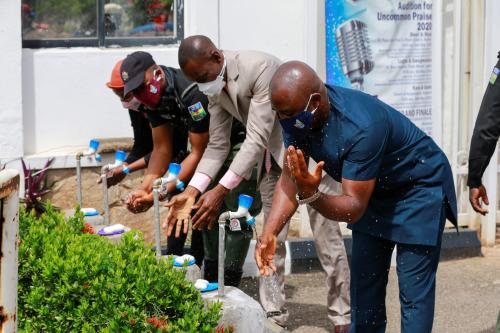
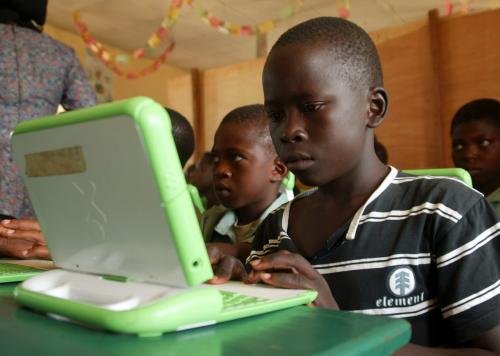
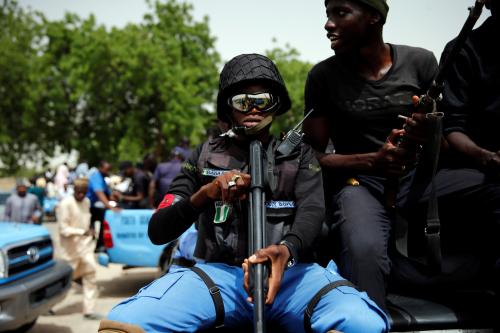

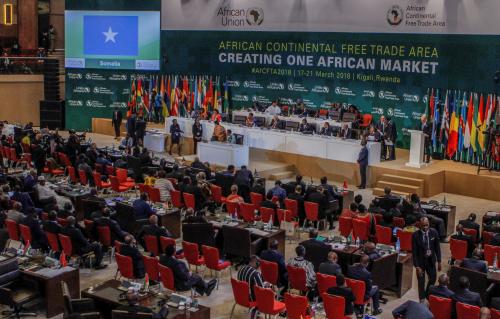
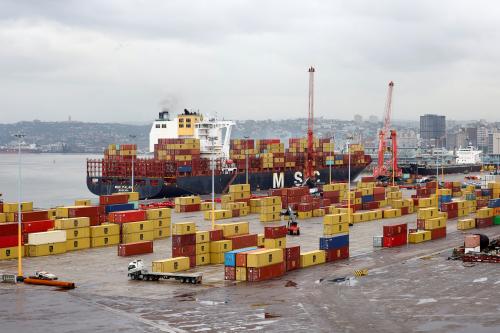
Commentary
Youth protests for police reform in Nigeria: What lies ahead for #EndSARS
October 29, 2020